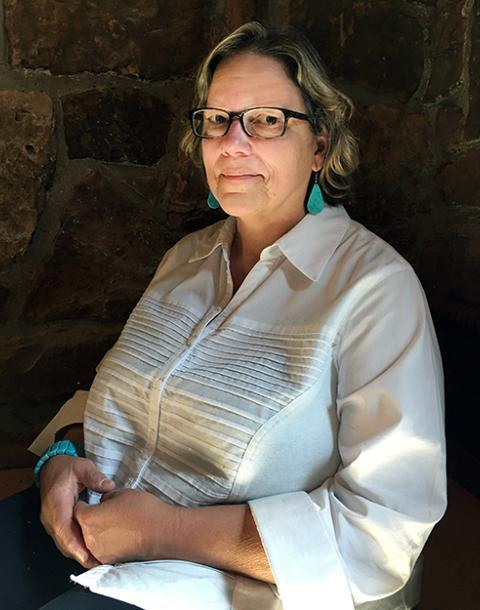 |
Canku Ota
|
 |
|
(Many Paths)
|
||
|
An Online Newsletter
Celebrating Native America
|
||
|
April 2021 - Volume
19 Number 4
|
||
|
|
||
|
Learning Our Languages
|
||
|
by Ruby Hansen Murray
- Osage News
|
||
March has been an intensive Osage language learning time for me, close to immersive. It's been productive and synergistic. I was able to take Osage Chelsea Hicks' month-long class Learning Our Languages: Support for Indigenous Language Beginners through the Continuing Education Department at the Institute of American Indian Arts. Tuition was $14, and we met twice a week. One of the requirements is that students take a language course. An Osage language series that the Nation's Language Department is offering through Northern California Osage was slated to begin in early March. Being focused on Osage in the particular ways that Chelsea's class required has made Wah Zha Zhe ie part of my days. I had ideas about how a language acquisition class might maximize my time in language learning, but what I got, since Chelsea is Osage, is a quasi-immersion experience. Chelsea models speaking your language as much as you can, so she often gave instructions in both Osage and English for the non-Osage speakers. There were times when students misunderstood her mimed instructions, but it was an opportunity to learn to ask, "can you say that again?" or "what does that mean?" in Osage. Stepping into the language like that was helpful. In this class the students included another Osage, a Diné, Choctaw, several Tewa folks, and someone working with Nahautl. It was beautiful to hear those languages, the living reminders that despite efforts to eradicate indigenous people, we're still here. Some students knew more than others, but the ancestors were in the room holding the space with us. Chelsea talked about the reality of the moments when someone asks you to begin speaking your language and the words you know disappear. For me the sensation was like the circuit breaker being flipped, I was sitting in the dark with no words coming when I opened my mouth. It was like being tossed into the pool when you can't swim. I remember moments in Pawhuska in Osage language class when the teacher said, "put your notes away and let's talk." Moving through that panic to choke out the needed sentences is immensely helpful in building fluency, but those initial moments—. I have to say the teachers in the Osage classes I took in person at the Language Department were always respectful and encouraging. I felt supported in learning the language in a positive environment, one that allowed mistakes and continued on. For some of us, those on-the-spot moments are worse than others. For me, with high expectations for myself, they're anxiety producing. Being a perfectionist, as many writers are, isn't helpful in language learning when you need to embrace not knowing, confusion. When she spoke to Northern California Osages in February, Language Department teacher Celena Noear affirmed that the only way to speak your language incorrectly is not to speak it at all. I'm embracing that. Chelsea encouraged us to step into the Osage words we do know. To not be embarrassed or concerned with all that we didn't know yet, but to work with what we have. It was painful. Because I didn't /don't know many words, some of the tasks were beyond me. Among the principles of language learning that Chelsea advocates is taking control of your language learning experience. You shouldn't have to feel badly, she suggested. It was like a reminder of safe touch, each of us can say "no," can practice self-care. After one humiliating experience, I adopted this myself, setting limits on the amount of sharing I felt comfortable with. I acknowledged that I didn't have the vocabulary or the time to puzzle out some of the particular tasks she set for us. While the intermediate students (Osage Bill Hamm and another Tewa classmate) read beautiful poems, my beginner's effort was a one-word contribution, which felt okay, because it was what I had to offer at the time. My spouse is a willing participant in this language-learning endeavor. We listened to the Osage language CDs driving home from our last visit to Oklahoma. We speak sentences to each other, going slowly till we're comfortable, starting in the kitchen. "????????????? ?????? ??????????????" I ask. Do you want coffee? The answers, "No, I don't want coffee," and "Yes, I do," are written on post-it notes near the espresso machine in orthography, phonetically and in English. Chelsea says learning language that connects with positive activities is reinforcing and creates the most effective learning conditions. We will expand our language if we keep trying. Saturday evening, we were walking toward the burn pile behind the barn as the moon, a hazy off-white disc, rose in a dull blue sky. "“???????????? ?????????? ????????????” I asked. Do you see the moon? |
||
|
|
|
|
||
|
|
||
| Canku Ota is a free Newsletter celebrating Native America, its traditions and accomplishments . We do not provide subscriber or visitor names to anyone. Some articles presented in Canku Ota may contain copyright material. We have received appropriate permissions for republishing any articles. Material appearing here is distributed without profit or monetary gain to those who have expressed an interest. This is in accordance with Title 17 U.S.C. Section 107. | ||
|
Canku Ota is a copyright ©
2000 - 2021 of Vicki Williams Barry and Paul Barry.
|
||
 |
 |
|
|
The "Canku
Ota - A Newsletter Celebrating Native America" web site and
its design is the
|
||
|
Copyright ©
1999 - 2021 of Paul C. Barry.
|
||
|
All Rights Reserved.
|
||
